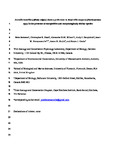Juvenile bonefish (Albula vulpes) show a preference to shoal with mojarra (Eucinostomus spp.) in the presence of conspecifics and another gregarious co-occurring species
Date
2020-06Author
Subject
Metadata
Show full item recordAbstract
Grouping behavior occurs across a wide variety of taxa, both within and between species. While members are thought to obtain foraging and antipredator advantages, they can also experience costs in the forms of competition or increased conspicuity to predators. The mechanisms behind these costs and benefits can vary depending on group composition, ultimately influencing the choice of which groups to join. Mixed-species fish shoals are common in shallow nearshore habitats, where research has shown that juvenile bonefish (Albula vulpes) occur among similarly-sized mojarras (Eucinostomus spp.) at a rate far exceeding that predicted given the fishes overlapping habitat use, suggesting that bonefish may actively select to join mojarras. To evaluate this hypothesis experimentally, we assessed the shoaling preferences of bonefish when presented with shoals of conspecifics, mojarras, or another gregarious co-occurring fish (pilchard; Harengula jaguana) in a laboratory setting. Focal juvenile bonefish (n = 25) were given the choice between: (i) conspecifics or mojarra, and (ii) conspecifics or pilchard, tested in shoal sizes of one, two, four, and eight. Bonefish were also given the choice between a mixed shoal (two conspecifics, two mojarra) as an alternative to single species shoals of either: (iii) four conspecifics, or (iv) four mojarra. Juvenile bonefish exhibited a strong association with mojarra, spending significantly more time with them than conspecifics in all but one treatment. Moreover, focal fish showed no detectable preference between conspecifics or pilchard, regardless of shoal size. In mixed shoal treatments, focal fish spent significantly more time wherever there was a higher proportion of mojarra. These findings imply that the co-occurrence of bonefish and mojarra in nature is largely a product of bonefish shoal choice behavior, and likewise that any costs that bonefish might incur by joining mojarras (i.e., oddity effects) are likely outweighed by the putative benefits of doing so, which potentially include access to social information and/or reduced intraspecific competition.
Publisher
Journal
Volume
Pagination
Number
Recommended, similar items
The following license files are associated with this item:


